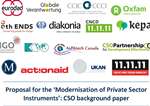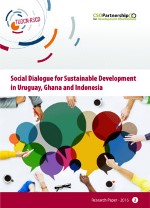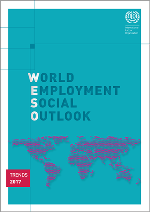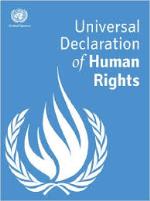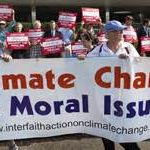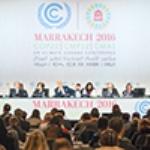Other news
Published on Thu, 2017-02-09 16:21
On March 9, the OECD's Development Assistance Committee will decide on how to include what are known as ‘private sector instruments’ (PSI), in aid. This could mean a dramatic increase in the use of aid to invest in or give loans to private companies, or to agree to bail out failed private sector projects, through guarantees. However, without strong safeguards and transparency standards there is a real risk that aid could be used as a backdoor subsidy for corporations with powerful lobbies in donor countries. |
Published on Fri, 2017-02-03 09:20
TUDCN has undertaken three national case studies in Ghana, Indonesia and Uruguay to analyse social dialogue within the countries in its various forms, with particular focus on the formalisation of these dialogues at different administrative levels and its contribution to development. The studies are authored by national trade union specialists and include examples of good practice as well as of limitations of the different contexts. |
Published on Thu, 2017-01-26 19:14
The global unemployment rate is expected to rise modestly to 5.8 per cent in 2017, representing an increase in the number of unemployed globally of 3.4 million compared with 2016, the International Labour Organisation (ILO) has said. In its World Employment and Social Outlook - Trends 2017 report released recently, the ILO said that this will bring total unemployment to 201.1 million in 2017. The ILO further said that the global unemployment rate is then expected to hold relatively steady in 2018, as the economic outlook improves, although the pace of labour force growth will still outstrip employment creation, resulting in an additional 2.7 million unemployed people. |
Published on Thu, 2016-12-15 15:28
Trade unions representatives at the United Nations consider it "positive" that "the indicators can still be improved" but warn that in not totally transparent processes, the targets can be distorted in the choice of indicators. Monitoring of the SDGs is to begin in 2017, and the Inter Agency Expert Group (IAEG-SDG) held its fourth meeting at the United Nations Grounds in Geneva on 17-18 November. The discussion was not conslusive. Trade unions analyse what is at stake. |
Published on Fri, 2016-12-09 14:59
The "unprecedented pressure" being placed on international human rights standards risks unravelling the unique set of protections that have been set in place after the end of World War II, the UN High Commissioner for Human Rights has said, in the run-up to Human Rights Day on 10 December. In a UN news release, the UN human rights chief Mr Zeid Ra'ad Al Hussein announced that on Human Rights Day, the UN Human Rights Office will launch a campaign entitled "Stand up for someone's rights today." |
Published on Fri, 2016-12-09 12:17
"As feminist, women’s rights and gender equality advocates we reaffirm our vision of a world where aid is no longer necessary. Where unequal power relations and undemocratic distribution of wealth and structures of injustices all forms of violence and war are transformed to create new forms of relations based on equality, dignity, respect and human rights that enhance solidarity, equity, inclusion, non-subordination and justice for all." Read here the statement by the Feminist Constituency at the High Level Meeting on the Global Partnership for Effective Development Cooperation that was held in Nairobi, Kenya, 28th November to 1st December 2016. |
Published on Thu, 2016-12-01 15:02
The role of private sector in development is currently one of the most debated issues in international cooperation. It is inscribed in a wider context where financial resources for official development assistance (ODA) are shrinking, development cooperation is evolving beyond the traditional ‘aid’ concept, and the actors/entities that can be key players in development are growing. Fortunately, development is seen more and more as a holistic process that should be supported by integrated global policies (such as trade, investments, etc.), bringing about improvements in terms of both economic and social progress, the latter being based on the full respect of human rights. The pivotal role of business in development discourse is based on the equation between economic growth and sustainable development, (voluntary) corporate social responsibility (CSR), enabling business environment provided by states, and finally public-private dialogues (private sector involved in policy making). The role of business has also been recognised in the United Nations 2030 Agenda for achieving Sustainable Development Goals. |
Published on Wed, 2016-11-30 10:46
“While there was some small cause for optimism at Marrakesh, the major issues were shuffled off, either never to be seen again or put aside for further ‘negotiation’ in the future. Overall, a disappointing result”, said Azeb Girmai, LDC Watch Climate Lead. On the positive LDC Watch welcomes the Renewable Energy initiative for Sustainable Development (REEEI) which was launched on the last day of the conference. This will scale up the provision of renewable energy to Least Developed Countries, particularly helping development in rural areas. |
Published on Fri, 2016-11-25 16:49
The Marrakech climate talks, which began on 7 November, closed on 19 November, with developing countries making a strong plea for pre-2020 climate action and for developed countries to fulfill their pre-2020 commitments. This call was made at the joint closing plenary of the twenty-second session of the Conference of the Parties (COP22), the twelfth session of the Conference of the Parties serving as the meeting of the Parties to the Kyoto Protocol (CMP 12) and the first part of the first session of the Conference of the Parties serving as meeting of the Parties to the Paris Agreement (CMA1). |
Published on Thu, 2016-10-20 10:20
A letter for governments regarding the need for an intergovernmental tax body to be established under the United Nations. The aim of this letter is to support the forces trying to bring this issue back on the agenda, and get as many countries as possible to speak out in favor. Ecuador has recently supported the idea of establishing a global UN tax body, and this creates new opportunities. However, this is not a "support Ecuador"-campaign, but rather an attempt to use the opportunity to get many more governments to speak out in favor of establishing an intergovernmental tax body. This is an effort to promote the creation of a Global Tax Body within the United Nations. Such an international tax body would help fight corruption and tax evasion and thus make more resources available for health, education and social services. |
SUSCRIBE TO OUR NEWSLETTER

